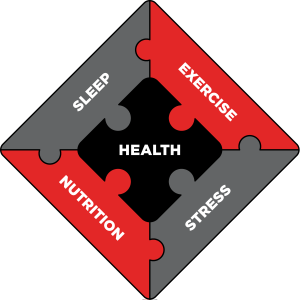7.0 Introduction
Learning Objectives
In this chapter you will learn about the interrelated nature of health and wellness. After reading this chapter, you should be able to do the following:
- Discover the impacts of stress, exercise, sleep, nutrition, and exercise on student success
- Identify how stress, sleep, nutrition, and exercise are an interconnected part of your ability to succeed as a student
- Evaluate and make informed decisions in regards to your personal health and wellness goals
- Identify resources that can help you take responsibility for your health and wellness goals
- Identify connections between your personal wellness and your future career
- Recognize how academic success connects to career success
Health and Wellness
Wellness is more than just avoiding disease. Wellness involves feeling good in every respect, in mind and spirit as well as in body. Your emotional health is just as important as your physical health—and maybe more so.
If you’re unhappy much of the time, you will not do as well as in college—or life—as you can if you’re happy. You will feel more stress, and your health will suffer. Still, most of us are neither happy nor unhappy all the time. Life is constantly changing, and our emotions change with it. But sometimes we experience more negative emotions than normally, and our emotional health may suffer. Emotional balance is an essential element of wellness—and for succeeding in college. Emotional balance doesn’t mean that you never experience a negative emotion, because these emotions are usually natural and normal. Emotional balance means we balance the negative with the positive, that we can be generally happy even if we’re saddened by some things. Emotional balance starts with being aware of our emotions and understanding them.
Paying attention to your physical, emotional, and mental health becomes more vital when attending college because learning is challenging. However, time pressures, schedule changes, and new responsibilities can throw students off their previous routines.
As a first-year college student you will make many choices without parental oversight, including the food you eat, and the way you take care of your body and brain. Some choices put you on a path to health, and other choices can lead you down a path toward illness. There is a strong connection between success in college and your ability to stay healthy.
 This chapter will focus on the interrelated nature of food, stress, and exercise and how making good decisions in one area helps support the others. Likewise poor decisions in just one of these areas can negatively affect the other two. It’s a careful balance that is often tested in your fist year at college.
This chapter will focus on the interrelated nature of food, stress, and exercise and how making good decisions in one area helps support the others. Likewise poor decisions in just one of these areas can negatively affect the other two. It’s a careful balance that is often tested in your fist year at college.
Good health habits also offer these benefits for your college career:
- More energy
- Better ability to focus on your studies
- Less stress, feeling more resilient and able to handle day-to-day stress
- Less time lost to colds, flu, infections, and other illnesses
- More restful sleep
Video: Student Wellness Centre Highlights
Video: Student Wellness Centre Highlights by Fanshawe College [:45] transcript available
“Chapter 11: Engaging in a Healthy Lifestyle – Introduction” from College Success by Amy Baldwin & Open Stax is licensed under a Creative Commons Attribution License
Feeling good in every respect, in mind and spirit as well as in body.
Balancing the negative with the positive in a way where we can be generally be happy even if we’re saddened by some things.

